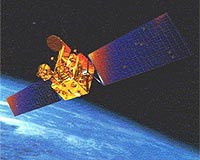 |
St. Louis (UPI) Sep 24, 2009 Boeing is proposing to join hands with NASA to research and develop commercially viable space transportation as a first step toward shipping astronauts and then possibly civilian travelers into the Earth's lower orbit. A Boeing Co. spokesman told United Press International an initial exploration of the potential program would focus on transporting astronauts to the International Space Station, Bigelow Aerospace's Orbital Space Complex, and other potential destinations in low Earth orbit, and bring them back. Boeing submitted its proposal to NASA Tuesday. At a later stage, the spokesman said, it could be possible to take commercial travelers into the space and back. Boeing said its proposal to NASA was designed to accelerate the development of commercial human space transportation. The spokesman said the proposal was made at NASA's initiative. Boeing hopes further research will lead to development of technologies that will take forward the commercial crew transportation system concept, facilitating astronaut traffic between Earth and space destinations. The key low orbit destination is the International Space Station, an international research facility launched in 1998 and due for completion in 2011. The ISS orbits at an altitude of about 220 miles above the surface of the Earth, traveling at an average speed of 17,227 miles per hour, completing 15.7 orbits daily. The ISS is managed jointly by NASA, Russia, the European Union, Canada and Japan, with additional participation by other nations. The Bigelow Aerospace Orbital Space Complex is part of an initiative backed by the Florida Legislature to promote the state's space transportation industry. Boeing said research on developing commercial space travel was part of NASA's Commercial Crew Development imitative. The CCDev initiative is intended to stimulate private-sector development of a commercially managed system that could be used for low orbit space transportation. Keith Reiley, Boeing program manager for the CCDev proposal, said the company's experience with proven human-rated spacecraft and its knowledge of the space station would allow it to work with NASA to develop "a commercially viable, yet safe, crew transportation system." He said Boeing would make "a substantial investment" in research and development of the crew transport system. Joining Boeing on the CCDev team will be Las Vegas-based Bigelow Aerospace LLC, providing additional investment and expertise toward building and deploying "a full-scale, crewed, commercial orbital space complex." Boeing has joined three other teams competing for CCDev agreements to support them with its experience. These teams are submitting their own separate proposals. NASA says it will sign funded agreements with one or more teams in November, using funds from the American Recovery and Reinvestment Act of 2009. About $50 million is likely to be available to distribute among the winning teams. Share This Article With Planet Earth
Related Links Launch Pad at Space-Travel.com
 Oceansat-2 Set For Launch Tomorrow From Sriharikota
Oceansat-2 Set For Launch Tomorrow From SriharikotaChennai, India (PTI) Sep 24, 2009 Oceansat-2 satellite that would help identify potential fishing zones and provide inputs for weather forecasting is poised to be launched into orbit on board the Polar Launch Satellite Vehicle from the spaceport of Sriharikota in the east coast, 90 kms from here, Wednesday. Riding piggyback on the 970 kg Oceansat-2, six other nano satellites - four from Germany and one each from Switzerlan ... read more |
|
| The content herein, unless otherwise known to be public domain, are Copyright 1995-2009 - SpaceDaily. AFP and UPI Wire Stories are copyright Agence France-Presse and United Press International. ESA Portal Reports are copyright European Space Agency. All NASA sourced material is public domain. Additional copyrights may apply in whole or part to other bona fide parties. Advertising does not imply endorsement,agreement or approval of any opinions, statements or information provided by SpaceDaily on any Web page published or hosted by SpaceDaily. Privacy Statement |